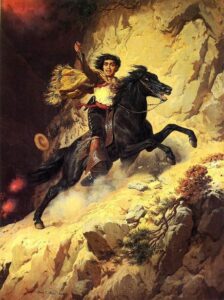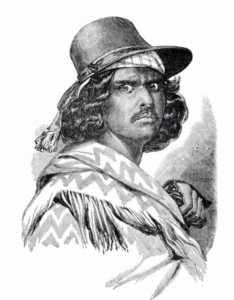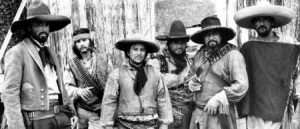
 What is the likelihood of a gang of thieves all having the same first name? Probably almost nil, but that is what happened with a gang called The Five Joaquins. The fact that they all had the same first name was the whole reason for the name, obviously. Every gang needs a name, and it must be unique. By having the same name and using that name as the gang’s name, it eliminated any argument over which of the men should be listed first. The Five Joaquins were said to be responsible for the majority of cattle rustling, robberies, and murders that were committed in the Mother Lode area of the Sierra Nevada Range in California between 1850 and 1853.
What is the likelihood of a gang of thieves all having the same first name? Probably almost nil, but that is what happened with a gang called The Five Joaquins. The fact that they all had the same first name was the whole reason for the name, obviously. Every gang needs a name, and it must be unique. By having the same name and using that name as the gang’s name, it eliminated any argument over which of the men should be listed first. The Five Joaquins were said to be responsible for the majority of cattle rustling, robberies, and murders that were committed in the Mother Lode area of the Sierra Nevada Range in California between 1850 and 1853.
While all the men were listed equally, the main “gang boss” was Joaquin Murietta. Other gang members were Joaquin Botellier, Joaquin Carrillo, Joaquin Ocomorenia, and Joaquin Valenzuela. The gang also included was Murietta’s right-hand man, Manuel Garcia, known as “Three-Fingered Jack.” At least he knew who they were talking about when the said his name. I actually find that quite amusing. To have to speak both first and last name when addressing each other, is quite funny. When they first got started, the gang began to terrorize the towns and gold camps because the Mexicans were being discriminated against in the mines and forced off their land by invading hordes of American miners. It was a type of retaliation, but it doesn’t appear that any such thing happened to any of the five or their non-Joaquin cohort. Nevertheless, it is believed that the gang stole more than $100,000 in gold, over 100 horses, as well as killing over 40 people…28 Chinese and 13 Whites. Three of them were lawmen who were killed while the gang was outrunning the posse sent to capture them.
California Governor John Bigler signed a legislative act into law on May 11, 1853, to create the “California State Rangers,” led by Captain Harry Love, who was a former Texas Ranger. I had never heard of the California State Rangers, but with a former Texas Ranger, I can see how they came to be. The “California State Rangers” had the one mission…to capture the “Five Joaquins.” This was a big undertaking and demanded big money. The California Rangers were paid $150 a month and stood a chance to share a $5000 reward for the capture of Joaquin Murrieta. It was great motivation. On July 25, 1853, a group of Rangers encountered a band of armed Mexican men near Panoche Pass in San Benito County, 50 miles from Monterey. A Battle ensued and resulted in the deaths of two of the Mexicans. One was claimed to have been Murrieta, and the other was thought to be Three-Fingered Jack. A plaque near the intersection of State Routes 33 and 198 now marks the approximate  site of Murrieta’s headquarters in Arroyo de Cantua. It is there where he was presumably and officially ruled by the State of California to have been killed. The problem is that the claim was soon disputed and has continued to be. Nevertheless, the result of that skirmish was that the gang broke up, and its activities ended. There were apparently no charges filed, possibly for lack of evidence. Some of the members returned to Sonora, while others remained in California. The killing didn’t stop their criminal activities, however, and they became vaqueros on California ranches, but some went straight, following other walks of life.
site of Murrieta’s headquarters in Arroyo de Cantua. It is there where he was presumably and officially ruled by the State of California to have been killed. The problem is that the claim was soon disputed and has continued to be. Nevertheless, the result of that skirmish was that the gang broke up, and its activities ended. There were apparently no charges filed, possibly for lack of evidence. Some of the members returned to Sonora, while others remained in California. The killing didn’t stop their criminal activities, however, and they became vaqueros on California ranches, but some went straight, following other walks of life.


Leave a Reply